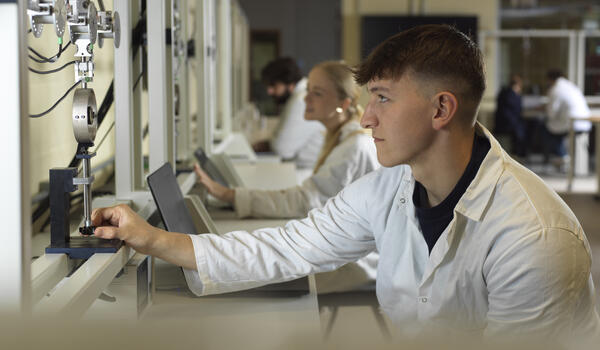Reach further into metabolism, find out more about exercise performance, and fully grasp the integrative nature of physiology in this engaging module. You will focus on the measurement and evaluation of physiological and metabolic responses to exercise, conquering technical laboratory and field-based skills. Through hands-on learning you will master how to test human economy, efficiency and resistance to fatigue. Moving beyond stand-alone physiological tests, you will engage in a more experimental approach, applying your knowledge to real-world sport and health-based scenarios.
Throughout your degree you gain a unique skills set based on your understanding of the interdisciplinary nature of sciences. In this module we develop your self-awareness of these skills and how to make the most of graduate-level employment opportunities.
We introduce you to the University’s employability resources including job search techniques and search engine use. We develop your skills in writing CVs and cover letters, and we draw on the expertise of employers and alumni. Your ability to effectively use these resources will enhance your employability skills, your communication skills and help you to develop a short-term career plan.
Become empowered to evaluate information critically, examine sport and exercise science research, make informed decisions and deliver actionable outcomes. You will learn qualitative, quantitative and mixed methods approaches to research study design, develop key data processing and analysis techniques, and become competent with statistical software packages. Developing key skills in statistical analysis, interpretation and reporting will enable you to make valid conclusions, add credibility to your work and become an evidence-based practitioner. This practically-focussed module will enable you to design high quality research of your own with confidence and apply research findings to real-world athletic and health contexts.
This module is core if undertaking a third-year project in this pathway. Otherwise, it is optional.
Concussion – is the evidence not convincing enough for rule change? Do we treat female athletes as ‘little men’? To HIIT or not to HIIT – is it all it’s cracked up to be? Just a few of the thought-provoking questions faced by Sports and Exercise Scientists. In this module you will open your mind to groundbreaking ideas and concepts that challenge the way we think about sports and exercise science and its impact on both the public and athletes. You will need to assess your critical outlook and participate in current debates with a calm, progressive, and evidence-based mindset. You will sharpen the essential skills of critical reading, critical writing, collaboration, communication, and argumentation. Get ready to expand your horizons and shape your perspective as a future sports and exercise scientist.
This dynamic module offers a deep exploration into how exercise shapes our wellbeing and the vital role health plays in the athletic world. You will investigate a range of exciting and current topics such as appraising prevention strategies for head trauma and concussion in contact sports to engaging with people living with medical conditions to uncover real-life challenges. With stimulating and specific case studies you will examine key medical issues from doping in sport and therapeutic use exemptions to the risk factors associated with non-communicable diseases. You will gain an appreciation for the crucial role a sport and exercise scientist plays in both public health and athlete care, all while developing an evidence-based approach grounded in the expertise of Lancaster Medical School



.jpg)
.jpg)
.jpg)